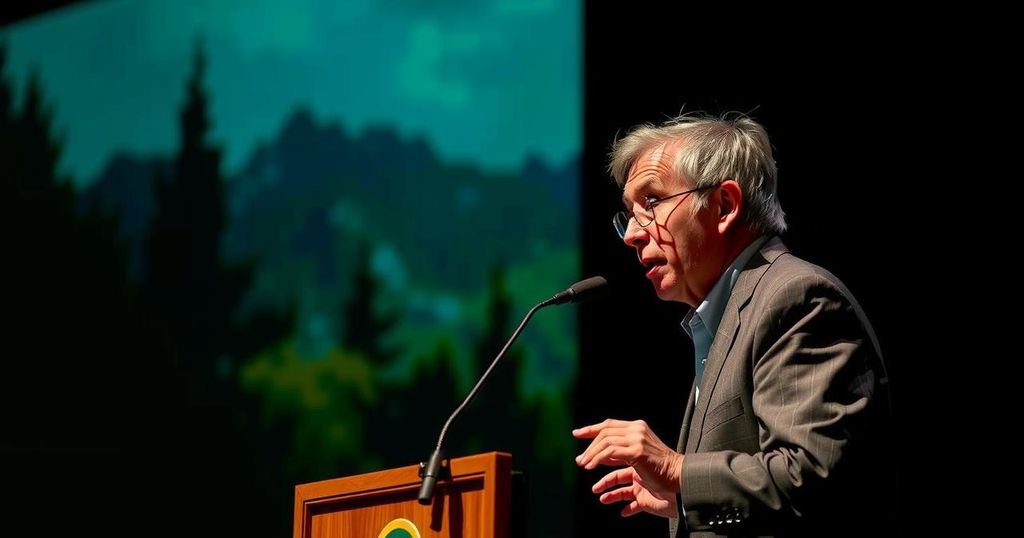On Thursday, the Human Rights Institute hosted Aaron Mair, a prominent activist and former Sierra Club president, for a discussion on intersectionality and the climate crisis. Mair emphasized the disproportionate effects of climate change on marginalized communities, advocating for equitable action. The event followed the United Nations COP 28 summit and featured insights from organizing professors on the importance of environmental activism, particularly among youth.
On Thursday, the Human Rights Institute had the honor of hosting Aaron Mair, an esteemed activist and former president of the Sierra Club, for an engaging lecture that examined the intersections between climate crisis and human rights. The event took place in the Casadesus Recital Hall and came in the wake of the United Nations COP 28 conference, which recently called for urgent international cooperation on climate issues. Mair’s discourse emphasized the multifaceted nature of the climate crisis, particularly the disproportionate effects faced by marginalized communities. He advocated for an intersectional approach in addressing these vulnerabilities, aligning with the urgent need for equitable climate action as highlighted in global discussions. The lecture was primarily organized by the institute’s co-directors, Professor David Cingranelli of political science and Professor Alexandra Moore of English. Professor Cingranelli expressed the critical nature of discourse surrounding environmental issues, stating, “Climate change is one of the most significant threats to human dignity. I expect that more and more people will come to realize the magnitude of the threat. As a result, I expect that there will be increasing activism, especially on college campuses, because young people have the most at stake.” Aaron Mair, known for his four-decade commitment to environmental justice, was the first Black president of the Sierra Club and has dedicated his career to addressing health disparities and advocating for the rights of marginalized communities affected by climate change. In his presentation, he underscored the urgent need for equitable solutions, stating that both U.S. communities and countries in the Global South face severe impacts, particularly in nondemocratic regions. Mair spoke of the alarming violence enacted upon environmental activists around the globe, noting, “We’ve got hundreds of wilderness activists that have been killed, murdered, shot, not only in Africa, but also in Central America, Latin America, heavily massacred in Brazil.” He discussed the relationship between natural disasters and systemic inequalities, using Hurricane Katrina as an example of how discriminatory policies exacerbate crises for Black, working-class residents. He observed, “Natural disasters like Hurricane Katrina led to wealth creation off of a crisis on the backs of communities of color.” Throughout his lecture, Mair urged students to engage actively within their communities to drive meaningful change, stressing that the fight against climate change is deeply rooted in humanity and requires an intersectional and intergenerational approach. He remarked, “I think someone mentioned that that term, intersectionality, is kind of overused, we hear it everywhere. But it’s an analytical lens and framework, and that’s what universities give you, analytical lenses and frameworks by which we can achieve great breakthroughs.” Mair contended that scientific knowledge must coincide with an understanding of social justice issues in effectively combating climate change, underscoring the historical leadership of communities of color in environmental justice movements. He concluded by calling for collective action and political engagement among the student body, stating, “We must do what is right, not just for our nation, come November, but for humanity.” The Human Rights Institute remains committed to fostering discussions on these critical themes. Students can look forward to new course offerings such as “Climate, Crime & Human Rights” in the upcoming winter semester, which will examine complex cases such as eco-terrorism and environmental crises. Professor Moore noted, “The Human Rights Institute helps to support the Food Justice Working Group which does research and participates in advocacy activities around environmental and food sustainability and food justice on our campus, in our community, and in New York state.”
The issue of climate change stands at the forefront of numerous global discussions, with a particular focus on the social implications and the disproportionate impact it has on marginalized and vulnerable communities. As international summits like the United Nations COP 28 gather leaders to address these concerns, the intersectionality of climate action with human rights becomes increasingly relevant. Prominent figures in environmental activism, such as Aaron Mair, emphasize the necessity of an integrated approach that recognizes the complex societal dimensions of environmental challenges, advocating for equitable solutions that support those most affected.
In conclusion, Aaron Mair’s lecture at the Human Rights Institute served as a crucial reminder of the interconnectedness of climate change and social justice. By urging a holistic and intersectional approach, Mair highlighted the urgent need to advocate for marginalized communities affected by environmental degradation. The commitment of educational institutions to engage in these dialogues is paramount, as it equips future leaders with the tools necessary to confront and resolve the pressing challenges posed by the climate crisis. The continued efforts at the Human Rights Institute will undoubtedly foster awareness, advocacy, and action on these critical issues.
Original Source: www.bupipedream.com






